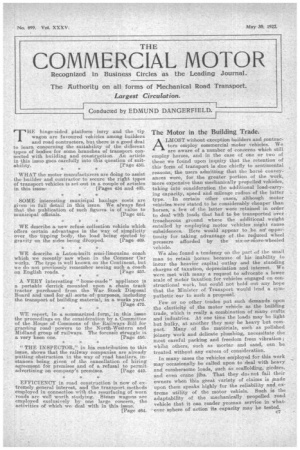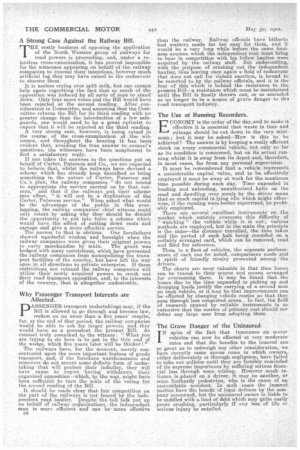The Motor in the Building Trade.
Page 1

Page 2

If you've noticed an error in this article please click here to report it so we can fix it.
ALMOST without exception builders and eontraetors employ commercial motor vehicles. We are aware of a number of concerns which still employ horses, and in the case of one or two of these we found upon inquiry that the retention of this form of transport is due chiefly to sentimental reasons, the users admitting that the horse conveyances were, for the greater portion of the work, more expensive than mechanically propelled vehicles, taking into consideration the additional load-carrying capacity, speed and mileage radius of the latter type. In certain other cases, although motor vehicles were stated to be considerably cheaper than horses a few of the latter were retained in order to deal with loads that had to be transported over treacherous ground where the additional weight entailed by employing motor vehicles might cause subsidences. Here would appear to be an oppor: tunity for taking advantage of the repeed wheel pressure afforded by the six-or-more-wheeled vehicle.
We also found a tendency on the part of the small man to retain horses because of his inability to incur the heavier capital outlay and the standing charges of taxation, depreciation and interest. We were met with many a request to advocate a lower scale of motor taxation for vehicles engaged on constructional work, but could not hold out any hope that the Minister of Transport would lend a sympathetic ear to such a proposal.
Few or no other trades put such demands upon the elasticity of the motor vehicle as the building trade, which is really a combination of many crafts and industries. At one time the loads may be light but bulky, at another they may be heavy but compact. Many of the materials, such as polished joinery work and delicate plumbing, necessitate the most careful packing and freedom from vibration ; whilst others, such as mortar and sand, can be treated without any exeess of consideration.
In. many cases the vehicles employed for this work may occasionally be called upon to deal with heavy and cumbersome loads, such as scaffolding, girders, and even crane jibs. That they do w not fail their owners when this great variety of claims is made upon them speaks highly for the reliability and extreme utility of the motor vehicle. Such is the adaptability of the mechanically propelled road vehicle that it can render yeoman service in what ever sphere of action its capacity may be tested.
A Strong Case Against the Railway Bill.
THE costly business of opposing the application of the North Western group of railways for road powers is proceeding, and, .under a relentless cross-examination, it has proved impossible for the witnesses appearing on behalf of the railway companies to conceal their intentions, however much artificial fog they may have raised in the endeavour to obscure them.
It is useless crying over spilt milk, but one cannot help again regretting the fact that s9 much of the opposition was induced by all sorts of sops to stand down. Only four more -votes and the Bill would have been rejected at the second reading. After consideration in Conamittbe, and assuming that the Committee returns the Bill for its third reading with no greater change than the introduction of a few safeguards, one would need to be a great optimist to expect that it will be rejected at the third reading. A very strong case, however, is being raised in the course of the cross-examination of the witnesses, and throughout the hearing it has hem evident that, avoiding the true answer to counsel's questions, the witnesses have been nonplussed to find a satisfactory reply.
If one takes the answers to the questions put on behalf of Carter, Paterson and Co., we are expected to believe that, whilst the railways have devised a scheme which has already been described as being something in the nature of Carter, Paterson and Co.'s plan, the railway companies " do not intend toappropriate the service carried on by that concern,' and that if the railways put their scheme intoeffect, " it will not be a duplication -of the Carter, Paterson service." When asked what would be the advantage of the 'public in this overlapping, the railway companies' chief witness could only retort by asking why they should be denied the opportunity to put into force a scheme which would have. the effect of cutting down costs and cartage and give a more effective service.
The answer to that is obvious. Our forefathers showed wonderful wisdom and foresight when the railway companies were given their original powers to carry merchandise by train. The grant was hedged with many restrictions, which have prevented the railway companies from monopolizing the transport facilities of the country, but have left the way open in all directions to private enterprise. If these restrictions are relaxed the railway companieS will utilize their newly acquired powers to crush out their road transport opposition, and, in the interests of the country, that is altogether undesirable.
Why Passenger Transport Interests are Affected.,
pASSENGER transport undertakings may, if the Bill is allowed Co go through and become law, reckon on no more than a five years' respite, for, at the end of that period, the railway companies would be able to ask for larger powers, and they would haue as a precedent the present Bill. As counsel truly remarked to the witness : "What you are trying to do here is to get in the thin end of the wedge, which five years later will be thicker I"
The railways have, for the moment, merely concentrated upon the more important feature of goods transport, and, if the furniture warehousemen and remOvers do not secure some definite form of undertaking that will protect their indugtry, they will have cause to regret having withdrawn their organized opposition—which, by the way, might have been sufficient to turn the scale of the voting for the second reading of the Bill.
It should be made clear that fair competition on the part of the railways is' not feared by the independent road haulier. Despite the tall talk put up on behalf of railway organizations, the independent man is more efficient and can be more effective
08 than the railway. Railway officials have hitherto had matters made far too easy for them, and it would be a very long while before the same business acumen which the independent man must bring to bear in competition with his fellow haulier were acquired by the railway staff. But undercutting, with the purpose of crushing' out the independent haulier, thus leaving once again a field of endeavour that does not call for violent exertion, is bound to be resorted to by the railway officials, and it is the fear of this which is behind the resistance to the present Bill—a resistance which must be maintained until the Bill is finally thrown out, or so amended as no longer to be a source of grave danger to the road transport industry.
The Use of Running Recorders.
ECONOMY is the order' of the day, and to make it effective it is essential that waste in time and mileage should be cut down to the very minimum; but it may be asked—How is this to be achievedl The answer is by keeping a really efficient check on every commercial vehicle, not only so far as its condition is concerned, but on its actual running whilst it is away from its depot and, therefore, in most cases, far from any personal supervision.
It must be remembered that a, vehicle represents a considerable capital value, and to be effectively employed it must be away at work for the maximum time possible during each day. Time expended in loading, and unloading, unauthorized halts on the road and dawdling over meals by the driver mean that so Much capital is lying idle which might otherwise, if the running were better supervised, be profitably employed.
There are several excellent instruments on the market which entirely overcome this difficulty of " watching" the vehicle while it is out; various methods are employed, but in the main the principle is the same—the distance travelled, the time taken and the period of each halt being recorded on a suitably arranged card, which can be removed, read and filed for reference.
Thus, in a 'fleet of vehicles, the separate performances of each can be noted, cornparisons made and a spirit of friendly rivalry promoted among the drivers.
The charts are most valuable in that time losses can be traced to their source and means arranged for overcoming them. It may be found that the losses due to the time expended in picking up and dropping loads justify the carrying of a second man on each vehicle, or it may be that improvements can be effected by changing vehicle routes so that they pass through less congested areas. In fact, the field of research opened by reliable instruments is so extensive that the matter of primary cost should not debar any large user from adopting them.
TheGrave Danger of the Uninsured.
IN spiteof the fact that insurance on motor vehicles can now he effected at very moderate rates and that the benefits to the insured are so great as to outweigh any other consideration, we have recently come across cases in which owners, either deliberately or through negligence, have failed to take out policies until they are forcibly reminded of its supreme importance by suffering serious financial loss through some mishap. However much reliance is .aalaced on a driver, it may be another, or some foolhardy pedestrian, who is the cause of an unavoidable accident. In such cases the insured parties have the benefit of lekai defence by the company concerned, but the uninsured owner is liable to be saddled with a load of debt which may quite easily prove crushing, particularly if any loss of life or serious injury be entailed.












































